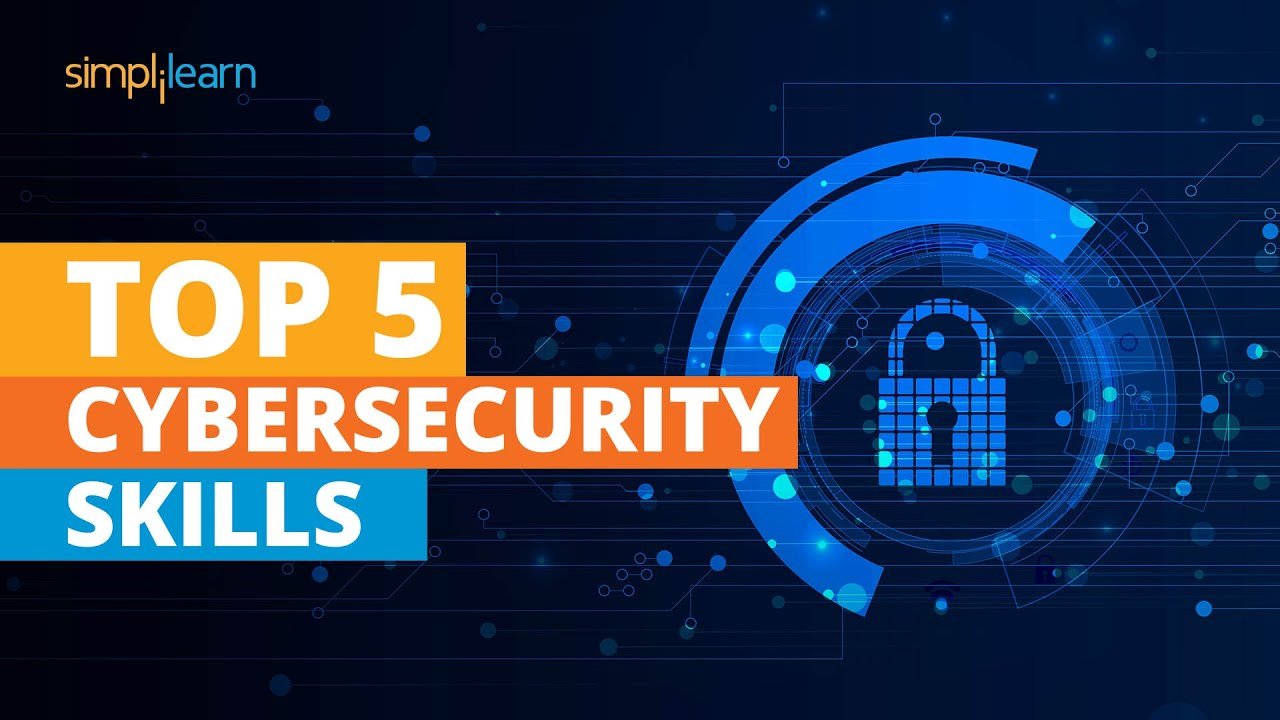
Top 8 Cybersecurity Skills You Must Have
Cyber Security Career | Cyber Security Training | Simplilearn
Table of Contents
With businesses increasingly moving online and shifting to cloud storage, the demand for cybersecurity is currently at its peak. With that milestone comes a high demand for cybersecurity experts who can safeguard digital data. A good cybersecurity professional must possess a rich and diverse skill set. This tutorial will explore the top eight cybersecurity skills (expanded from five due to popular new advances!) that will help you get into cybersecurity.
Top 5 Cybersecurity Skills
1. Networking and System Administration
- An in-depth understanding of networking is required to start a career in cybersecurity. Learning networking will help you understand data transmission’s technical aspects, which will help you secure your data. It is advisable to take networking certifications like CompTIA Security+ and Cisco CCNA.
- Another skill that will benefit you is mastering system administration. It is all about configuring and maintaining computers. You must be curious to know every aspect of your computer’s features and settings and play around a bit.
2. Knowledge of Operating Systems and Virtual Machines
- A cybersecurity professional must have a strong knowledge of operating environments such as Windows, Linux, and Mac OS. However, it would help if you were happy to work with any operating system. VMs allow you to train and research in an isolated environment and help you maximize your skills.
- The next point to remember is to know Kali Linux. It is the most widely known Linux distribution for ethical hacking and penetration testing. It comes with several hundred tools related to Penetration Testing, Malware Examination, Security research, PC Criminology, etc.
3. Network Security Control
- Network Security Control refers to the measures employed to enhance a network’s security. You need to know how your network works, including how routers, firewalls, and other devices work. A firewall is equipment or programming that blocks active or approaching traffic from the Web to your PC. As a cybersecurity expert, you must leverage a firewall to filter and prevent unauthorized traffic onto the network.
- Additionally, you must know about Intrusion detection systems, Interruption Avoidance Frameworks, Virtual Confidential Organizations (VPNs), and remote access. For example, you should operate the IDS and recognize any security policy violations and malicious traffic on the network.
4. Coding
- Having zero coding knowledge may limit your cybersecurity opportunities in the future. Hence, it would help if you acquainted yourself with a few coding languages.
- Given below is a rundown of a couple of coding dialects you can figure out how to have an influential career in cybersecurity:
- C and C++: C and C++ are low-level programming languages you must know as a cybersecurity professional.
- Python is a well-known high-level programming language that is becoming popular among cyber experts. It can help you identify and fix vulnerabilities.
- JavaScript: A good advantage of knowing JavaScript is that you can prevent cross-site scripting attacks.
- PHP: Most websites are created using PHP; learning it will help defend against intruders.
- HTML: HTML is another language cybersecurity professionals should understand, as most websites use it, and it is one of the easiest languages to learn.
- Go lang: It is excellent for cryptography; you can solve various cybersecurity problems.
- SQL: Attackers use this language to damage the stored data; one example is the SQL injection attack. Hence, having a good understanding of SQL(Structured Query Language) is beneficial.
- Assembly Language: Assembly will help you understand how malware functions work and help you defend against it.
5. Cloud Security
- Companies seek professionals with security skills applicable to public and hybrid cloud platforms such as AWS and Azure. More organizations want to use cloud infrastructure to store data and run applications. This includes implementing policies and technologies that protect cloud-based systems and devices.
- Like Application Development Security, Cloud Security also involves building secure systems. People with experience and knowledge managing big platforms, such as Microsoft Azure, AWS, and the Google Cloud Platform, are in high demand.
6. Blockchain Security
- Blockchain’s popularity is increasing, thanks in part to the level of security it offers. Consequently, cybersecurity professionals should become familiarized with blockchain and how it handles security issues. Consider it preparing for the future.
- Blockchain will likely make security inroads into Internet of Things devices (more on this later), network control, supply chain integration, identity control, and mobile computing.
- Blockchain’s complex nature makes it difficult for intruders to compromise. To corrupt or destroy a blockchain, cybercriminals should dispense with the information on every client’s PC associated with the designated worldwide organization.
7. The Internet of Things (IoT)
- According to Statista, over 30 billion Internet of Things devices will be connected worldwide by 2025. With such a vast number of devices comes many more opportunities for security vulnerabilities. Therefore, IoT security will soon become a higher priority, an essential part of maintaining the integrity and security of the overall Internet system.
- Many IoT devices are sensors that collect personal data, which raises the stakes in keeping networks secure and preserving consumer confidence.
- IoT security emphasizes protecting connected devices and networks over the Internet, especially since most devices access networks without human intervention or oversight. Therefore, it becomes essential to ensure that proper security measures are in place so that IoT devices can be left alone to perform their functions automatically without cybersecurity experts concerned about keeping out unauthorized intruders.
8. Artificial Intelligence (AI)
- Like blockchain, artificial Intelligence (AI) is a relatively young innovation that is enjoying widespread use. AI is perfect for the cybersecurity sector, as it brings reliability and consistency to cybersecurity measures, helps security professionals identify suspicious activity, and imparts a greater understanding of the cyber environment.
- AI brings automation and support unmatched by human capabilities, catching threats that may go unnoticed and unaddressed.
- Artificial Intelligence can also be trained to learn and evolve, making it better equipped to handle new emerging threats and hacking techniques.
Additional Cybersecurity Skills
Now, go through a set of additional skills that can help you get into the cybersecurity field:
- Risk Analysis: Cybersecurity professionals must identify, oversee, and moderate dangers. Risk the executives and moderation abilities will be sought after before long.
- Information Security: Companies require skilled professionals to shield electronic information from unapproved access.
- Security Incident Handling & Response: As a cybersecurity expert, you should be ready to deal with any certified danger of disregarding an association’s security strategy. With security incident management, you must identify, manage, record, and analyze security threats in real-time. As a security practitioner, you must also manage and analyze the security information and event management (SIEM) tools and services.
- Security Audit: An internal check is conducted to find flaws in the organization’s information system. Security audit and compliance knowledge are crucial because any missed area of regulatory compliance might incur significant fines and penalties for the organization.
- Laws and Regulations: This is an often overlooked cybersecurity aspect. There are several cybersecurity laws and guidelines that you ought to know about. These restrictions characterize how you can utilize the Web and shield individuals from becoming survivors of cybercrimes.
Apart from these additional cybersecurity skills, stay updated with new hacks and learn new tools, as cybersecurity is an evolving field. You should have other vital skills besides technical skills, known as “soft skills.” Having a set of good soft skills will help you get your dream job. You can watch this video on the top five soft skills that will help you grow in your career and incorporate those skills: Top 5 Soft Skills.
Cybersecurity is a widespread ability, with 3.5 million workers opening in 2023! Network safety experts can procure somewhere in the range of ₹6LPA and ₹32LPA per year.
Start your journey with our FREE Cybersecurity course today!
Conclusion
What is cyber security skill for a CV?
In your skills section, list technical abilities matching your desired job. For cyber security, skills like firewall knowledge, understanding different operating systems, and basic coding are good to list. Show any hands-on experience with security tools or software.
Does cyber security need coding?
Do Cybersecurity Analysts Code? Coding skills are not needed for most passage-level network safety occupations. As network safety experts look for mid- or upper-level positions, coding might be important to progress in the field.
Is cybersecurity difficult?
Although cybersecurity degrees are typically less sought after than those in exploration or lab-escalated fields like science and design, they are generally more testing than non-research degrees like those in the humanities or business.
Can I learn cyber security in 3 months?
Learning cybersecurity in three months is an ambitious goal. While it might be challenging, it's certainly feasible, particularly if you have strong groundwork in related regions and are willing to devote considerable time and effort. Fundamental Information: Comprehend essential PC organizing ideas.










